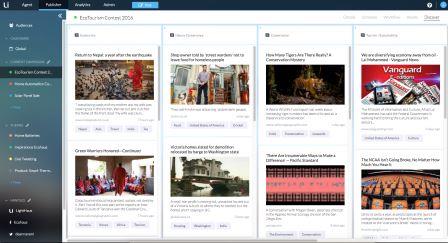Lithium launches Reach, a Klout-informed social content marketing tool
The data-driven insights, the company said, help marketers avoid “throwing spaghetti at walls” to see what kinds of social content stick.
Social community provider Lithium Technologies is today announcing a new social content marketing product called Lithium Reach that is intended to leverage its secret weapon: Klout.
In 2014, Lithium bought Klout, which provides scores that rate people’s online influence by tracking about 700 million consumers online. It has utilized the acquisition for such purposes as helping to rate experts in its online communities, but now it is employing Klout’s data to determine what kinds of social content cause the biggest ripples.
“Your [Klout] influence is measured by how engaging” your posts are, Lithium CMO Katy Keim pointed out to me. She noted that the element missing in much social content marketing is user engagement, as illustrated in a recent study from social analytics platform Socialbakers that found average user engagement with organic social content is an abysmal 0.2 percent.
The company further explains:
Klout has vast visibility into the engagement behavior across social networks, both independent to specific networks like Twitter and Facebook, and at an aggregate level. We calculate a personalized time profile for every Reach customer, based on the activity timing of their followers and others in their influence graph (anyone their [followers] touch, and their [followers’] followers, and so on).
If camera maker GoPro, for instance, wants to post user- or brand-created content about skydiving, Klout assumedly would have data on which kinds of skydiving-related content have created the biggest impact, where they were posted, and when.
“Elsewhere,” Lithium points out, “marketers are still throwing spaghetti at walls.”
Using Klout, Lithium Reach allows a brand to curate, manage and publish content generated in the branded Lithium online communities, content from the social networks or content created by the brand. It offers native integration with Facebook and Twitter and manual access to other networks, as well as collaborative features and campaign reporting.
The tool automatically determines the right time to publish, recommends content from communities or social channels and suggests relevant trending topics, all of which are intended to specifically address the brand’s history, audience behavior and target social networks. Here’s a screen from Reach:
Lithium said that its early testing indicates Reach’s recommendations can lead to a 25-percent increase in engagement and a 50-percent increase in workflow efficiency as brands reduce email and streamline their processes.
In addition to Klout’s guidance, Lithium also sees Reach being differentiated — from the company’s previous social management capability, as well as from competitors’ — by its integration with its existing Response product, which is designed to handle inbound customer service requests. Both Reach and Response now share a dashboard, Keim noted, so a marketer can immediately see incoming queries relating to recently issued social content or can issue social content in response to inquiries.
As an example, she said, if Skype notices that people are coming to its Response-assisted Contact Center wanting to know how to use the voice/video/chat service for business, Skype can turn around and use Reach to generate and disseminate social content about “three ways to use our service in business.”
Marketing Land – Internet Marketing News, Strategies & Tips
(30)





